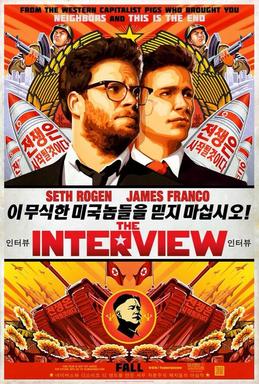On December 23, Sony announced that its controversial movie, The Interview, would play in certain theaters on its originally-intended release date, Christmas Day. After receiving threats from hackers known as “The Guardians of Peace,” who broke into Sony’s security system and collected sensitive information, Sony initially canceled the movie’s release. The Guardians of Peace threatened U.S. moviegoers as well, stating, “We will clearly show it to you at the very time and places The Interview be shown, including the premiere, how bitter fate those who seek fun in terror should be doomed to.” Though Sony Pictures CEO Michael Lynton was quick to shift the blame to individual theater owners, Sony could and should have done a lot more to ensure the success of The Interview. Had Sony been more steadfast in its defense of the movie’s release in the wake of the threat, fear would not have spread so quickly and the threat would have been forgotten.
By signing off on The Interview, which depicts the violent assassination of North Korean leader Kim Jong-un, Sony knew that the film would be met with resistance. Due to the volatile nature of U.S. relations with North Korea, the company even consulted the White House prior to the movie’s release. Leaked emails revealed that Sony was in contact with multiple White House officials who ultimately did not oppose the film or its portrayal of Kim Jong-un’s death. On multiple occasions, the stars of the movie, Seth Rogen and James Franco, were asked what they thought the effect of the movie would be. “At best, it will cause a country to be free,” Rogen told Rolling Stone, “and at worst it will cause a nuclear war. Big margin with this movie.” Clearly, everyone involved in the film was aware of the risks involved in its production. Nonetheless, Sony was intimidated by the threats it should have expected. By telling movie theater owners that they could choose whether or not to show The Interview, though, it legitimized the rhetoric-fueled threats. As a result, many of the major movie theater chains, such as Regal, AMC, and Cinemark, will not screen the movie.
Now that the U.S. government has confirmed that North Korea was behind the attack on Sony, it is even more imperative that the company give its wholehearted support to the movie. Not only does Sony’s lackluster support threaten to undermine freedom of speech in the U.S., but also it gives credence to a likely illegitimate threat. Regal Entertainment Group explicitly stated that their decision not to show The Interview in their theaters was “due to the wavering support of the film … by Sony Pictures as well as the ambiguous nature of any real or perceived security threats.” All Sony did was prompt unnecessary panic among the general public.
On December 24, one day after announcing the limited theater release of The Interview, Sony made the movie available online. It can be rented for $5.99—significantly less than most movie theater ticket prices—or purchased for $14.99 on seetheinterview.com. After over 200 theaters stated that they were willing to screen the movie despite the hackers’ threats, Sony eliminated any chance these theaters had at making a profit by making The Interview available online. These small theaters put themselves in danger by backing Sony’s film, but will now likely receive no benefit for this risk because moviegoers would rather watch The Interview in the comfort of their own homes.
From the movie’s inception, it was clear that The Interview would be a controversial film that would have to be promoted and distributed with great care. Sony completely failed in this respect. The company damaged its own chance to make a profit off the movie by initially pulling it from theaters and stabbed its supporters in the back by releasing it online when some theaters were willing to screen it on Christmas Day. Ultimately, this incident was a victory for hackers whose goal was to intimidate and influence the American public. It is hard to believe that all of this panic started over a movie that is not that good anyway.
Image source: Wikipedia.
